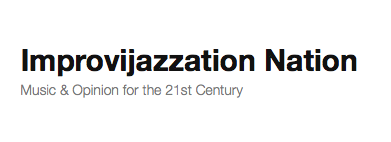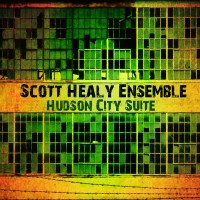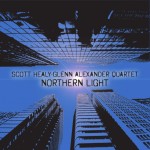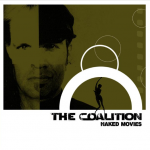Jazz Times Magazine: "Northern Light" Review 4/13

Jazz Times “Northern Light” by the Scott Healy – Glenn Alexander Quartet
03/29/13 Albums By Scott Albin
Northern Light– Scott Healy-Glenn Alexander Quartet
Comparisons can easily be made to the styles of Pat Metheny, or Keith Jarrett with Charlie Haden and Paul Motian, but this quartet is clearly secure in its own identity.
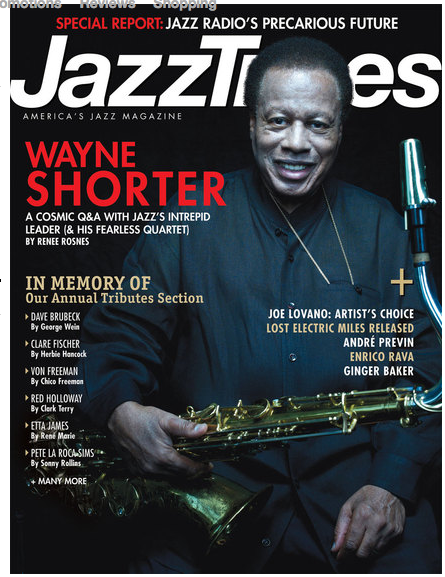 The appealing music on this newly released CD was actually recorded in December of 1991 when pianist Scott Healy and guitarist Glenn Alexander went into a New York studio with bassist Kermit Driscoll and drummer Jeff Hirshfield and created these six tracks covering an economical 38 minutes. Unfortunately, both Healy and Alexander quickly got busy on other projects, with the pianist landing a full-time gig with the new Late Night with Conan O’Brien show, and the master tapes were shelved for over 20 years. In 2012 Alexander found a cassette containing music from that 1991 session and played it for his students at Sarah Lawrence College, who reacted so favorably that he and Healy reassessed and agreed that the music deserved wider exposure. “Holy shit! I don’t know if I can play that well now,” was Healy’s reaction, according to Bill Milkowski’s liner notes. Said Alexander: “I feel we play together, in a certain way, as well as anybody I know.” The music is lyrical, free-flowing and untethered rhythmically, and the group interaction is of the highest order, owing in part no doubt to the fact that this was a working band at the time. “One of the things I think that now makes it sound good,” said Healy, “is that we’d had two decades of overproduction and insensitive rhythm section playing. This idea of a bunch of guys playing free and really listening…we didn’t get that a lot in the ’90’s, I don’t think.”
The appealing music on this newly released CD was actually recorded in December of 1991 when pianist Scott Healy and guitarist Glenn Alexander went into a New York studio with bassist Kermit Driscoll and drummer Jeff Hirshfield and created these six tracks covering an economical 38 minutes. Unfortunately, both Healy and Alexander quickly got busy on other projects, with the pianist landing a full-time gig with the new Late Night with Conan O’Brien show, and the master tapes were shelved for over 20 years. In 2012 Alexander found a cassette containing music from that 1991 session and played it for his students at Sarah Lawrence College, who reacted so favorably that he and Healy reassessed and agreed that the music deserved wider exposure. “Holy shit! I don’t know if I can play that well now,” was Healy’s reaction, according to Bill Milkowski’s liner notes. Said Alexander: “I feel we play together, in a certain way, as well as anybody I know.” The music is lyrical, free-flowing and untethered rhythmically, and the group interaction is of the highest order, owing in part no doubt to the fact that this was a working band at the time. “One of the things I think that now makes it sound good,” said Healy, “is that we’d had two decades of overproduction and insensitive rhythm section playing. This idea of a bunch of guys playing free and really listening…we didn’t get that a lot in the ’90’s, I don’t think.”
No true tempo exists for Healy’s “Spiral,” yet he and Aleander’s inquistive musings, at varying levels of intensity, are given a firm underpinning by Driscoll and Hirshfield’s intuitive support. Comparisons can easily be made to the styles of Pat Metheny, or Keith Jarrett with Charlie Haden and Paul Motian, but this quartet is clear
Equally secure in its own identity. Alexander recorded “Christmas Day” two years later on his 1993 Rainbow’s Revenge fusion album, but prefers this earlier treatment. His twangy guitar and Healy’s crystalline piano combine mellifluously on the vibrant, uplifting theme. The pianist’s solo conveys an urgent pulse from the onset, with darting and spinning lines, as Hirshfield provides provocative accentuations. Driscoll’s improv is characterized by a cavernous sound and a serious determination. Alexander’s regrettably brief but impactful statement leads back to the theme before an energetic dual coda of sorts by the co-leaders.
Healy’s “November” first appeared on his 1989 Songs Without Words release with a ten-piece ensemble, but this is a more spacious, uncluttered version, starting with Driscoll’s ruminating solo. Healy and Alexander offer up the glistening, spiritual theme prior to the guitarist’s acoustic, heartbreakingly moving exposition. Healy succeeds him with an ever-probing quest replete with trickling extended passages. The reprise is somehow both plaintive and reassuring. Alexander’s reverbed intro sets the mood for the following spiraling theme of his “To the Point,” delivered in unison fashion by guitar and piano. Driscoll and Hirshfield keep a supple foundation for Healy’s coolly pulsating solo, while Alexander interjects dissonant washes that are surprisingly effective. A seamless guitar/piano interlude is breathtakingly executed until more of Alexander’s distortions furnish an unusual closure.
“Chimes” contains Healy’s reflective, mournful rubato intro that is underscored by composer Alexander’s eerie, sweeping, synthesizer-like guitar effects. Alexander then magically shifts into a warm, glowing solo that endears rather than provokes. Healy supplies sensitive comping and a subsequent essay that is richly layered and touching. The piece then returns to a dialogue between lyrical piano and otherworldly electronics similar to the one that began it all. Driscoll and Hirshfield’s input and receptiveness contribute still more valuable texture to this eloquent performance. Healy’s unadorned “Northern Light” features an ostinato in 6/4 played by him simultaneously on piano and synth. Alexander’s warped sound adds drama to his spiky improvisation, with Driscoll’s fretless electric bass–heard just on this one selection–producing a somewhat ominous backdrop. The track comes full circle as the simple ostinato reappears, reinforcing the message that seems to pervade this entire CD: “less is more.”


